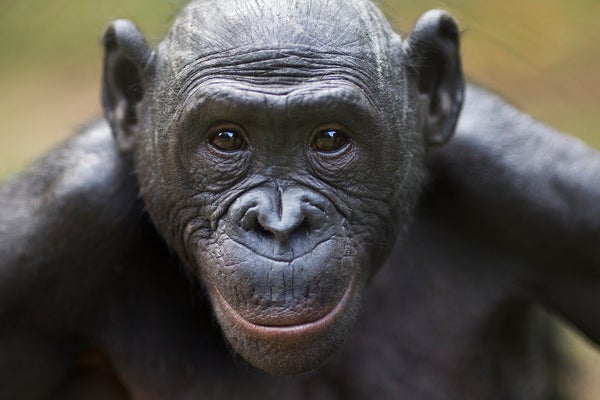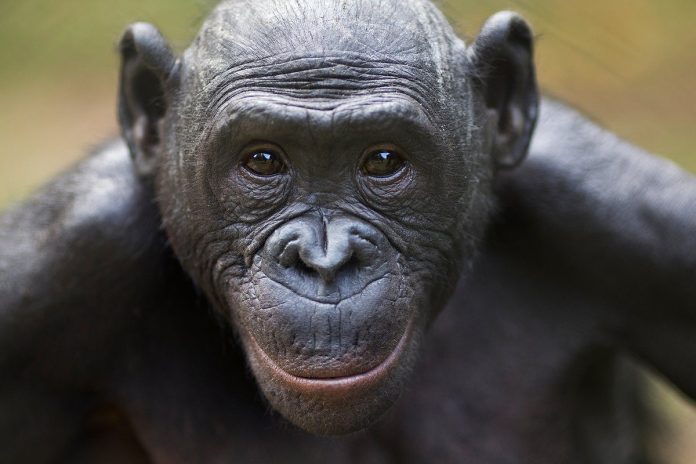February 3, 2025
3 min read
Bonobos Can Tell When a Human Doesn’t Know Something
An experiment shows that bonobos can understand when a human lacks knowledge and point them in the right direction

A few captive bonobos recently faced a seemingly simple task: locate a tasty snack hidden under one of three cups. Because bonobos are brainiacs, pinpointing the cup with the treat should have been no sweat.
But there was a wrinkle: the apes were relying on a human, not another member of their own species, to flip over the correct cup. What’s worse, this person sometimes did not see where the food was placed. So the bonobos took it upon themselves to point out the correct cup to their human partner.
“The bonobos knew when their partner was ignorant, and they communicated proactively to make sure that their ignorant partner still made the correct choice,” says Christopher Krupenye, an evolutionary cognitive scientist at Johns Hopkins University, who helped run the experiment.
On supporting science journalism
If you’re enjoying this article, consider supporting our award-winning journalism by subscribing. By purchasing a subscription you are helping to ensure the future of impactful stories about the discoveries and ideas shaping our world today.
Krupenye and his graduate student Luke Townrow described the bonobos’ behavior in a paper published today in the journal Proceedings of the National Academy of Sciences USA. Their findings provide compelling evidence that the apes can infer someone’s ignorance and also act to help clear up the confusion.
The ability to infer the mental states of others is often referred to as theory of mind. Humans utilize theory of mind to successfully communicate and coordinate with one another. For example, intuiting when someone lacks certain information helps us determine when and how to share knowledge.
Researchers have proposed that humans’ closest evolutionary cousins, chimpanzees and bonobos, may also possess theory of mind. But few have examined this idea in controlled experimental environments, according to the authors.
Krupenye and Townrow worked with three male bonobos living at Ape Cognition and Conservation Initiative, a research center in Des Moines, Iowa. During the experiment, one of the male bonobos would sit across from Townrow as a treat, like a grape or a peanut, was placed under one of three cups on the table between them. If Townrow flipped over the correct cup, the bonobo would receive the reward.
In some trials, Townrow could see the treat being placed under the cup. In others, his view was blocked by cardboard. Once the treat was stashed, he would wait 10 seconds before flipping over a cup.
The bonobos appeared to know when Townrow had his eye on the treat. In the trials where he had observed the placement of the treat, the apes patiently waited for him to flip over the correct cup. In the trials where Townrow’s view was blocked, however, the bonobos pointed toward the correct cup in an effort to fill him in on what he had missed. “They got the task immediately and knew where to point,” Townrow says.
The oldest of the bonobos, a male named Kanzi, was particularly demonstrative in his gestures to get Townrow to wise up. The now 44-year-old ape is always on the lookout for a tasty snack, and during the study, he repeatedly pointed and tapped to get Townrow’s attention and secure his treat.
According to Michael Tomasello, a comparative psychologist at Duke University, who was not involved in the new study, chimpanzees are also able to discern ignorance and modify their communication as a result. A 2012 paper found that wild chimpanzees produced vocalizations to warn group mates who appeared to be unaware of a nearby snake. Similar capabilities have even been observed in human infants. “They point out things that others are unfamiliar with while they are still in diapers,” Tomasello says.
This suggests that the ability to infer and act upon others’ ignorance may date back to the last common ancestor of humans and bonobos, which lived between eight million and six million years ago. It also illustrates that this level of understanding is possible without language, according to Laura Lewis, a biological anthropologist at the University of California, Berkeley. “I think this finding points to the idea that our great ape cousins can represent both knowledge and ignorance states in others and use these attributions to guide their communicative behaviors without the need for complex language,” says Lewis, who was not involved in the new study.
Yet it remains unclear whether the apes are simply pointing to secure a treat or if there is a greater motivation at play. “Are the bonobos aware that communicating is changing someone’s mental state, or is that [knowledge] something that evolved later in human evolution?” Krupenye says.
The team aspires to tease this question out with future work on bonobos. But these great apes, which are native to the forests of the Democratic Republic of Congo, are endangered because of habitat loss and hunting. Krupenye hopes this work will highlight how similar these apes are to us. “Bonobos play an important role in helping us understand our place in the natural world,” he says.






